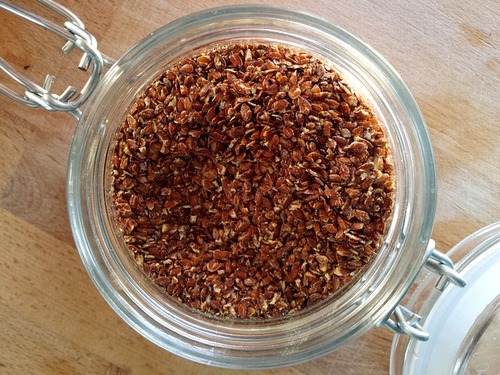Short answer
Although more research is needed, studies already conducted are promising regarding the several potential health benefits of flaxseed.
Recommended Alternative
Long answer
Did you know that the linen in your closet has something in common with flaxseed? Both come from flax, a plant of the genus Linum. First, let’s answer the question – is flaxseed bad for you? Overall, absolutely not. Now, let’s get to the nitty-gritty – how can flaxseed benefit your health and what risks, if any, does flaxseed pose.
The first thing to know about flaxseed is that it contains an extremely high amount of Omega-3 fatty acids – almost three times as much as that found in salmon. Omega-3 fatty acids are important in heart health. However, it is important to note that some researchers point to the fact that the omega-3s found in flaxseed may not be as effective as that found in fish. Also of concern is store bought flaxseed, which has been pre-ground. This process may cause a significant lowering in available omega-3 levels. However, flaxseed does not depend solely on its omega-3 content to benefit the heart.
An excellent source of dietary fiber, flaxseed helps lower LDL (bad) cholesterol levels, thus reducing the risk of atherosclerosis and cardiovascular disease. While we may normally look for foods abundant in calcium to improve our bone health, the truth is that calcium alone is not sufficient. It requires magnesium to be absorbed properly in the bones and not deposited in soft tissues. Fortunately, flaxseed is a great source of magnesium.
Another necessary component of healthy bones is phosphorous, a mineral found in flaxseed which is also essential for basic cellular function. Other important minerals found in flaxseed include manganese and copper, both of which serve as co-factors for the powerful antioxidant enzyme superoxide dismutase. Copper, plays several other key roles, including collagen formation and introducing iron into red blood cells. As far as vitamins go, flaxseed is an excellent source of vitamin B1, necessary to metabolic function and brain development. Lignans found in flaxseed may help reduce the risk of breast cancer.
Along with a possible reduced risk of breast cancer, flaxseed is also being studied for its beneficial effects regarding reducing menopausal symptoms, treating diabetes, and improving kidney function in people with lupus.
Now, let’s discuss the risks associated with flaxseed. One of its possible benefits – that of treating diabetes – is due to its potential ability to lower blood sugar. This, however, can be dangerous for people already taking medication for diabetes, as such medication in combination could lead to dangerously low levels of blood sugar, resulting in unconsciousness and/or seizure. Another risk to beware of is that flaxseed can slow blood clotting and combined with medicine that does the same, may cause bruising and bleeding. Lastly, avoid eating raw or unripe flaxseed, as it may be poisonous.
Possible short-term side effects
- may interact with:
- diabetes medication
- medication designed to slow blood clotting

Benefits
- improves heart function
- improves brain function
- improves bone health
- may prevent cancer
- may improve kidney function in people with lupus
- improves digestion
- improves metabolic function
- lowers ldl cholesterol
Our Wellness Pick (what is this?)
Spectrum Organic Flaxseed
- Rich in Omega-3
- High dietary fiber
- Organic certified
- Non-GMO
- Antioxidant properties
 Approved by
Approved by 








.png)






